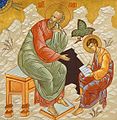Prochorus (deacon)
- Machine translation, like DeepL or Google Translate, is a useful starting point for translations, but translators must revise errors as necessary and confirm that the translation is accurate, rather than simply copy-pasting machine-translated text into the English Wikipedia.
- Consider adding a topic to this template: there are already 5,027 articles in the main category, and specifying
|topic=will aid in categorization. - Do not translate text that appears unreliable or low-quality. If possible, verify the text with references provided in the foreign-language article.
- You must provide copyright attribution in the edit summary accompanying your translation by providing an interlanguage link to the source of your translation. A model attribution edit summary is
Content in this edit is translated from the existing Spanish Wikipedia article at [[:es:Prócoro]]; see its history for attribution. - You may also add the template
{{Translated|es|Prócoro}}to the talk page. - For more guidance, see Wikipedia:Translation.
Saint Prochorus | |
|---|---|
 Prochorus and St John depicted in a 1609 Armenian gospel manuscript | |
| Bishop of Nicomedia | |
| Died | 1st century Antioch, Province of Syria, Roman Empire |
| Venerated in | Oriental Orthodox Churches Eastern Orthodox Church Catholic Church |
| Feast | 20 Tobi (Coptic Christianity)[1] |
Prochorus (Greek: Πρόχορος, Prochoros) was one of the Seven Deacons chosen to care for the poor of the Christian community in Jerusalem (Acts 6:5). According to later tradition, he was also one of the Seventy Disciples sent out by Jesus in Luke 10.
Tradition calls Prochorus the nephew of Stephen the Protomartyr. St Prochorus accompanied the holy Apostle Peter, who ordained him to be the bishop in the city of Nicomedia.[2] He is also thought to have been a companion of John the Apostle, who consecrated him bishop of Nicomedia in Bithynia. Some modern scholars dispute his having been the author of the apocryphal Acts of John,[3] which is dated by them to the end of the 2nd century.[4] According to the late tradition, he was the bishop of Antioch and ended his life as a martyr in Antioch in the 1st century.[5][6]
In Orthodox iconography, he is depicted as a scribe of St John the Evangelist. He is one of 4 out of the 7 deacons of the 70 Apostles to be jointly celebrated on July 28.[7]
Gallery
-
 John the Evangelist with Prochorus
John the Evangelist with Prochorus -
 Prochorus and St John depicted in Xoranasat's gospel manuscript in 1224.
Prochorus and St John depicted in Xoranasat's gospel manuscript in 1224.
References
- ^ "Toba 20 : Lives of Saints : Synaxarium - CopticChurch.net".
- ^ Feasts and Saints – OCA
- ^ Seven Deacons – Catholic Encyclopedia
- ^ Ehrman, Bart D. (2003). Lost scriptures : books that did not make it into the New Testament (Pbk. ed.). New York: Oxford Univ. Press. pp. 94. ISBN 978-0-19-514182-5.
- ^ "The Ecole Glossary". Archived from the original on 2013-02-04. Retrieved 2011-06-12.
- ^ Martyrologium Romanum ad Novam Kalendarii
- ^ Ekkart Sauser. "Prochorus (deacon)". Biographisch-Bibliographisches Kirchenlexikon (BBKL) (in German). cols. 0–-0.
External links

- Prochorus – Ökumenisches Heiligenlexikon
- Ekkart Sauser. "Prochorus (deacon)". Biographisch-Bibliographisches Kirchenlexikon (BBKL) (in German). cols. 0–-0.
- v
- t
- e
| Individuals |
|
|---|---|
| Multiple | |
| Groups |
- Aeneas
- Agabus
- Ananias (Damascus)
- Ananias (Judaea)
- Ananias son of Nedebeus
- Apollos
- Aquila
- Aristarchus
- Barnabas
- Blastus
- Cornelius
- Damaris
- Demetrius
- Dionysius
- Dorcas
- Elymas
- Egyptian
- Ethiopian eunuch
- Eutychus
- Gamaliel
- James, brother of Jesus
- Jason
- Joseph Barsabbas
- Judas Barsabbas
- Judas of Galilee
- Lucius
- Luke
- Lydia
- Manaen
- (John) Mark
- Mary, mother of (John) Mark
- Matthias
- Mnason
- Nicanor
- Nicholas
- Parmenas
- Paul
- Philip
- Priscilla
- Prochorus
- Publius
- Rhoda
- Sapphira
- Sceva
- Seven Deacons
- Silas / Silvanus
- Simeon Niger
- Simon Magus
- Sopater
- Sosthenes
- Stephen
- Theudas
- Timothy
- Titus
- Trophimus
- Tychicus
- Zenas
Herod's family
| Gospels | |
|---|---|
| Acts |
- Achaicus
- Alexander of Ephesus
- Alexander the Coppersmith
- Andronicus
- Archippus
- Aretas IV
- Artemas
- Carpus
- Claudia
- Crescens
- Demas
- Diotrephes
- Epaphras
- Epaphroditus
- Erastus
- Eunice
- Euodia and Syntyche
- Herodion
- Hymenaeus
- Jesus Justus
- Junia
- Linus
- Lois
- Mary
- Michael
- Nymphas
- Olympas
- Onesimus
- Onesiphorus
- Pudens
- Philemon
- Philetus
- Phoebe
- Quartus
- Sosipater
- Tertius
- Tryphena and Tryphosa












